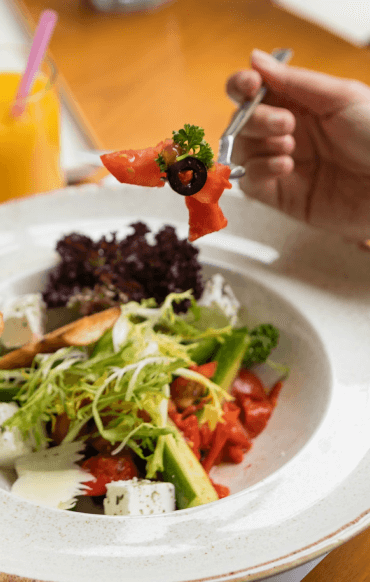
Proper nutrition feeds not just the body, but also the mind and spirit, paving the way for optimal health and well-being. Unfortunately, many people think of dieting when they think about having good nutrition. In this article, you’ll learn specific changes you can make to your nutrition, without following a diet trend, improving your overall health and helping you feel your best.
What is Holistic Wellness?
This includes the use of holistic nutrition, which focuses on consuming natural foods that provide essential nutrients without the harmful effects often associated with processed foods.
What Role Does Nutrition Play in Holistic Wellness?
For example, healthy fats, including omega-3, fatty acids, and short-chain fatty acids, are vital for brain health, mood regulation, and reducing inflammation. These fatty acids are crucial components of a balanced diet rich in nutrients that support not only physical health but also mental well-being.
Additionally, foods rich in beneficial gut bacteria, such as fermented foods, enhance gut health, which is directly linked to the gut-brain axis and plays a significant role in mental health and immune system support.
Specific Ways To Practice Good Nutrition: Beyond Diet Trends
Instead, it’s more important to incorporate practices such as mindful eating, where you focus on the experiences and impacts of food on your body and mind. Limiting processed foods can also be helpful, which reduces your intake of unnecessary sugars and unhealthy fats. Incorporating natural foods into your diet also ensures you receive essential nutrients without the additives found in many processed items.
These practices create a holistic approach to nutrition that supports your overall health, rather than just pursuing temporary changes.
Mindful Eating
Mindful eating is about developing an awareness of your eating habits, the sensory experiences of food, and the signals your body sends about taste, satisfaction, and fullness. The practice of mindful eating enables you to pause between your triggers and your actions, helping you break free from habitual eating behaviors. Here are some ways to incorporate mindful eating into your routine:
Eat slowly
Take time to chew your food thoroughly, which aids digestion and allows you to truly taste and enjoy the flavors.
Eliminate distractions
Try to eat away from your desk, TV, or smartphone. This helps you focus on the eating experience and listen to the cues your body is giving you about satiety and satisfaction.
Engage all senses
Notice the texture, color, aroma, and even the sounds different foods make as you eat them. This can turn eating into a more delightful and immersive experience.
Check in with your hunger cues
Before eating, ask yourself how hungry you are. This can prevent overeating and help you learn to distinguish between true hunger and eating out of boredom or emotion.


Limiting Processed Foods
Processed foods often contain excessive amounts of sodium, sugars, and unhealthy fats, which can contribute to a variety of health problems, including heart disease, obesity, and diabetes. Reducing your intake of processed foods can dramatically improve your health. Here’s how you can start:
Read labels
Be wary of foods with long ingredient lists and additives that are difficult to pronounce. This often signals that a food is highly processed.
Shop the perimeter of the grocery store
This is where you’ll typically find fresh produce, meats, and dairy, as opposed to the central aisles which are often filled with processed foods.
Cook at home more often
This allows you to control the ingredients that go into your food, ensuring meals are healthier and contain fewer processed components.
Choose whole grains
Select whole grains over refined ones. Whole grains such as quinoa, brown rice, and whole wheat have their natural fiber, vitamins, and minerals intact.
Incorporating Natural Foods Into Your Diet
Natural foods are those that are minimally processed and free from artificial substances. Eating more natural foods is crucial for getting the nutrients your body needs to function optimally, including helping to improve your nutrient absorption. Here are some tips for incorporating more natural foods into your diet:
Prioritize organic and local produce
Organic foods are grown without synthetic pesticides and fertilizers, and local produce is likely to be fresher and full of flavor.
Increase your vegetable and fruit intake
Try to fill half your plate with vegetables and fruits at every meal. They are high in essential nutrients, fiber, and antioxidants.
Choose lean proteins and healthy fats
Incorporate a variety of proteins from both animal and plant sources, such as fish, lean meats, beans, and legumes. Healthy fats can be found in nuts, seeds, avocados, and olive oil.
Experiment with herbs and spices
Instead of relying on salt and sugar for flavor, use herbs and spices. This not only enhances the natural taste of your food but also provides health benefits.

By focusing on mindful eating, reducing your intake of processed foods, and incorporating more natural foods into your diet, you can significantly enhance your holistic wellness journey and reduce your risk of chronic diseases. Each of these strategies is interconnected, supporting not just physical health but also contributing to mental and emotional well-being.
Holistic Wellness at National Wellness Group
We will then come up with a plan to improve and restore your overall health with a holistic approach. Treatment will vary based on your specific needs, but typically will include a combination of prebiotic and probiotic supplements, IV therapy, making changes to your diet with foods you like that are full of nutrients, combining functional medicine with quantum energy and quantum diagnostics (and turning them into healing energies), and more.
Our team of leading health practitioners at National Wellness Group are determined to improve your health.

